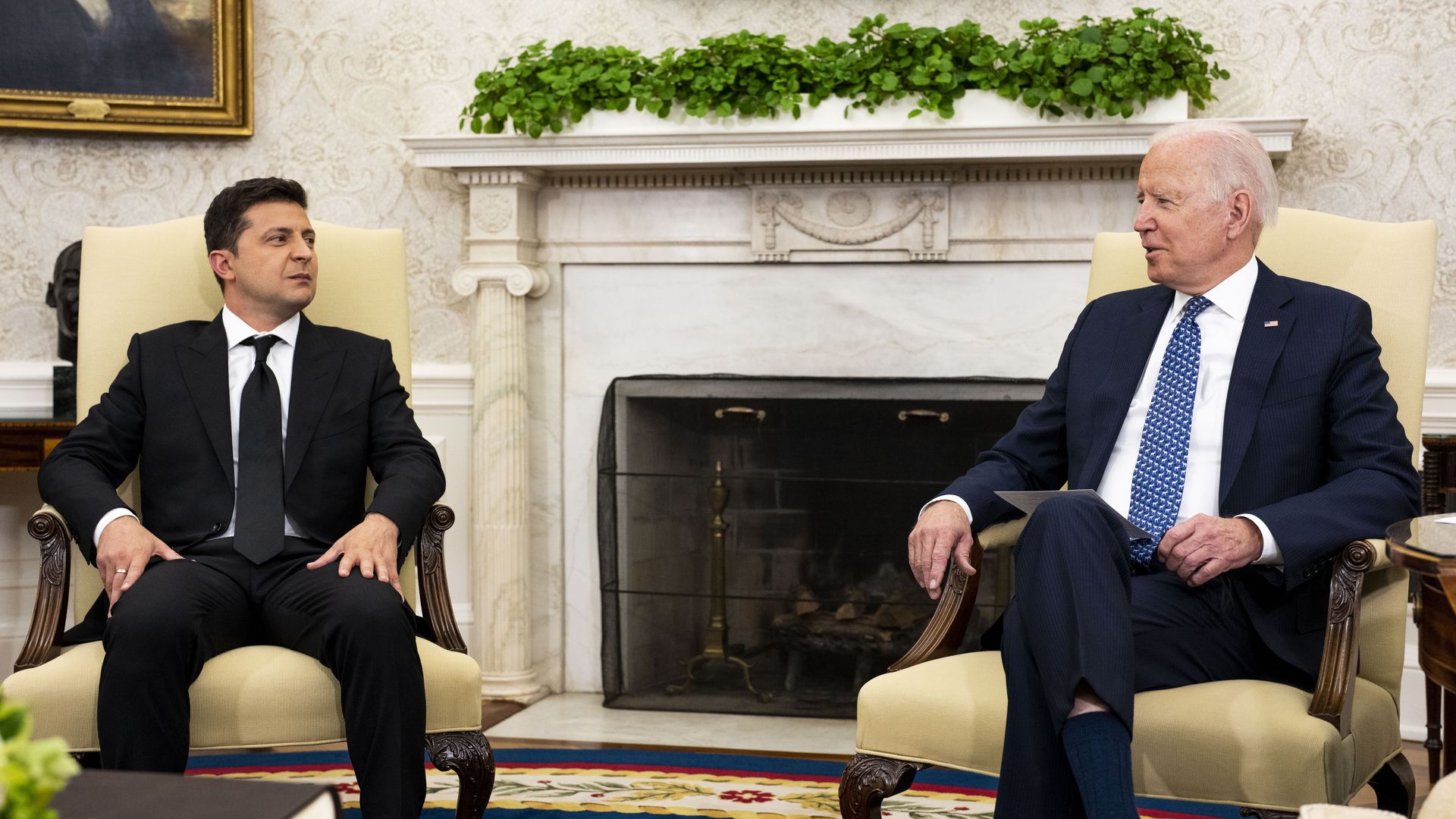Ukraine publicly pleads with U.S. Senate to sanction Putin's pipeline
Add Axios as your preferred source to
see more of our stories on Google.

Zelensky visiting Biden in September. Photo: Doug Mills/The New York Times/Bloomberg via Getty Images
Ukraine's President Volodymyr Zelensky has launched a Twitter campaign to get the U.S. Senate to back sanctions in a last-ditch effort to block the Nord Stream 2 pipeline.
Why it matters: President Biden waived sanctions on the operator of the Kremlin-backed pipeline, which will bypass Ukraine and deliver Russian gas directly to Europe, in order to protect the U.S. relationship with Germany.
- Congressional sanctions, already passed by the House of Representatives on a voice vote, would also need to be adopted by the Senate to be included in the annual National Defense Authorization Act.
- The Senate version of the NDAA has advanced out of committee, but a floor vote has not yet been scheduled.
What we’re watching: In recent months, Russia has been leveraging its energy exports — and exacerbating an energy crisis in Ukraine and Europe — in some of the very ways that critics of Nord Stream 2 had warned about.
- As Russian President Vladimir Putin squeezes Ukraine with his energy exports, he's amassing close to 100,000 troops near Ukraine's borders along with battle tanks and self-propelled artillery.
- Sources in the U.S. national security community are increasingly concerned that Russia will invade Ukraine again and seize even more territory than it did in 2014.
Driving the news: "Blackmailing Europe over gas must be stopped forever," Zelensky tweeted on Friday. "We're grateful to the House for including an #NDAA amendment that will stop Nord Stream 2. Asking all friends of and in the US Senate to now back this amendment at the Senate level."
- The amendment Zelensky is referring to has been introduced by a group of Republican senators, led by Senate Foreign Relations Committee ranking member James Risch (R-Idaho).
- The amendment would impose mandatory sanctions on the company in charge of the Nord Stream 2 pipeline, overriding the Biden waiver that effectively green-lit the completion of the pipeline earlier this year.
- The amendment would also remove remaining waivers on sanctions against the companies involved in testing and certifying the pipeline.
Flashback: Biden reached an agreement with German Chancellor Angela Merkel in July intended to stop Russia from weaponizing energy projects like Nord Stream 2 to harm vulnerable nations such as Ukraine.
- The agreement states that Germany will impose consequences on Russia if it uses energy as a weapon. The language leaves plenty of room for inaction, and on Oct. 26, the German Ministry of Economics certified that Nord Stream 2 does not pose a threat to the energy security of Germany or the European Union.
- Opponents of the Nord Stream 2 pipeline, including members of Congress and senior officials from Eastern European governments, criticized the U.S.-Germany deal for being toothless and carried out over their heads.
What they're saying: Biden officials are now acknowledging that Russia is using energy in a concerning way. Amos Hochstein, the State Department's senior adviser for global energy security, told CNBC that it almost amounts to weaponization.
- "They [Russia] have come very close to the line of using it as a weapon," Hochstein said, "by suggesting that if a political decision was taken in Germany … to certify the Nord Stream 2 pipeline, all of a sudden, gas would appear, and there would be plenty of gas from Russia for Europe."
- But by stopping short of calling it weaponization, the Biden administration is leaving itself room to avoid imposing additional sanctions on the pipeline.
- The State Department and White House did not immediately respond to a request for comment.
What to watch: Construction on Nord Stream 2 has been completed, and the pipeline is now awaiting regulatory approval from Germany. It's unclear if the sanctions would stop the gas from flowing — but there's no doubt it would make moving forward very painful for Germany.

